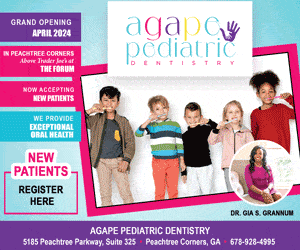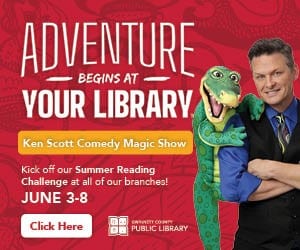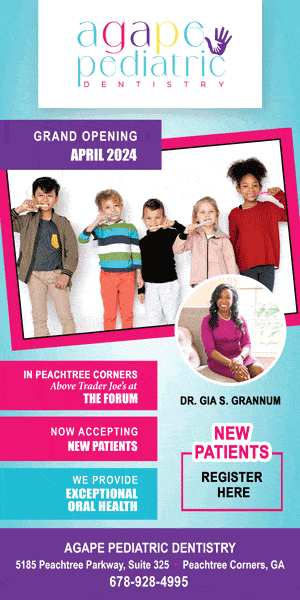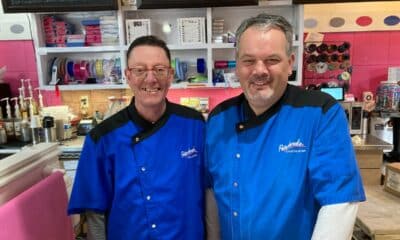Community
Tara’s Journey with Mesothelioma, Banning Asbestos in Georgia and the Mission [Podcast]
Published
4 years agoon
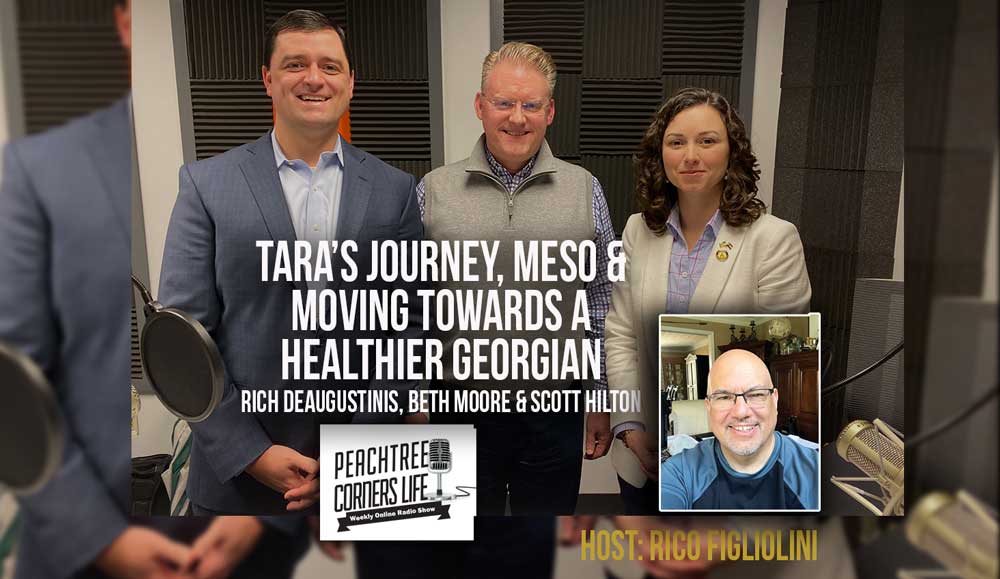
On this very special episode of Peachtree Corners Life, Rico Figliolini sits down with Rich DeAugustinis to talk about the cause and effect of asbestos as Rich shares the heartwarming story of his wife Tara’s battle with mesothelioma. Join them as well as Georgia State House Representative (District 95) Beth Moore and Scott Hilton (Executive Director for the Georgians First Commission under the Office of the Governor) about their mission with The Asbestos Free Georgia Bill.
Related Links:
Learn more about Tara’s story: https://www.curemeso.org/blog/tara/
Learn more about Mesothelioma: CureMeso.org and Cancer.gov
Beth Moore: Beth.Moore@house.ga.gov and MooreForGeorgia.com
Scott Hilton: (404) 950-8902 and @ScottHiltonGA
Rich DeAugustinis: (404) 547-8153 and Rich@DeAugustinis.com

Show Notes:
[00:00:30] Introduction
[00:04:00] Tara’s Story
[00:08:06] Introduction of guests; Beth and Scott
[00:11:11] Learning more about Mesothelioma
[00:16:54] How Rich got involved
[00:21:47] Banning asbestos in Georgia
[00:27:59] Next steps
[00:34:14] Setting up a National Patient Registry
[00:41:36] The Asbestos Free Georgia Bill
[00:44:16] Closing
MORE RELATED LINKS:
Tara’s Meso Journey
This is a collection of the blog updates that Tara and I wrote during her journey. They provide excellent context on what happened and the consequential impact on our family.
My YouTube Video about Asbestos & Mesothelioma
A video I did in Dec 2018 explaining Tara’s mesothelioma journey and death, and the link to current news re: asbestos tainted Johnson & Johnson’s baby powder. Also, this coverage from 11 Alive following my video…
GA Asbestos Ban Press Conference
This is the YouTube link to the press conference we had on Sept 26 (Meso Awareness Day) to announce our intentions to propose a ban on asbestos in GA, and an article from the GDP on the press conference.
https://www.reuters.com/investigates/special-report/usa-health-fda-talc/
Podcast Transcript:
Rico: [00:00:30] Hi everyone. This is Rico Figliolini host of Peachtree Corners Life. I appreciate you guys coming on and listening to our show. This is an evening here in the city of Peachtree Corners, and actually this podcast room is at Atlanta Tech Park in Tech Park, Atlanta. We’re on the Mobility Road here. The Curiosity Lab at Peachtree corners is a 1.7 mile track. Autonomous vehicles can run here. It’s a live living lab that interacts with people on the road with cars on the road, and it’s used and it’s owned by the city to allow other companies to be able to come here and do the work of internet of things, mobility, anything that has to deal with your phone, mobile devices, cars, autonomous vehicles and all that. So Atlanta Tech Park is on that road, and I want to introduce a lead sponsor of ours called Hargray Fiber. They understand business is unique and every business needs a unique package to be able to be successful and Hargray Fiber is a major player in the Southeast. They provide customized solutions for hundreds of businesses throughout the Southeast. They are based in Hilton Head, they are very community friendly. They reach out to the communities that they go into. They provide fiber to the small businesses, to also enterprise level businesses. Looking for a full suite of IT services, including voice, TV and internet connectivity. So no matter what business or industry you’re in Hargray Fiber, which is the backbone of Curiosity Labs at Peachtree Corners. Believe it or not, even though it’s 5G enabled and it’s wireless and all that, you still got to bring the internet and buy some way and Hargray Fiber does that through their fiber. So if you want to find out more information, please visit HargrayFiber.com. So now that I’ve gotten introductions out of the way, we have a good group of people here. I want to be able to introduce our first, first of three guests here, and that is Rich DeAugustinis.
Rich: [00:02:31] Good evening. How are you, Rico? Yes, DeAugustinis is indeed…
Rico: [00:02:34] DeAugustinis. And mind you, I tried that before we went on, so sorry about that Rich. So we’re here really on a serious note, we’re going to be discussing a little bit about, you know, the word is asbestos. And, I think anyone that is familiar with that word and old enough to understand where that word came from and all that, thought like me, maybe that it was banned a long time ago in the seventies and eighties. It has not been done, at least not in the United States. And Richard, we’re going to talk about the asbestos journey, which is a journey that, it’s a short journey, but provided a spark I think at the end of it that you really have taken ownership of wanting to make Georgians healthier and provide a path to that safety net, if you will. And I want to talk about that. So, Peachtree Corners Magazine has a profile on the asbestos journey. So if you haven’t gotten a copy in the mail and every household in the city has, should be. If you haven’t, let me know. Otherwise, you could go online at LivingInPeachtreeCorners.com. Find the digital edition there and you can read that story along with others in Peachtree Magazine. And, you know, the comments on this. If you’ve seen it on Facebook, I’d love to know a little bit more about your journey as well, if you’re familiar with this. So Richard, tell us, tell us. Start from the beginning.
Rich: [00:04:00] Actually four years ago, this coming weekend, cause it was my daughter’s winter break four years ago this coming weekend, Tara had her initial onset of symptoms. We were at Disney, for Aubrey’s winter break and Tara was, we thought she just had a cold that had
turned into pneumonia. And she said, I’m just going to stay in bed, you guys go enjoy Disney. So unfortunately, Aubrey and I went and enjoyed Disney for a few days. And we would come back after each day and I would insist that we go back to Atlanta and she would say, no, I’m fine. And she got progressively worse and progressively worse. By the time we did get back to Atlanta, it was very serious, and we went to Emory Johns Creek the next day. And, it turns out she had a tremendous amount of fluid around her right lung. It’s called a pleural effusion. And that pleural effusion was caused by Meso, but at the time, we didn’t know that. We went through a series of, pretty quick doctor’s appointments. I will tell you that was a huge blessing because there are some folks that don’t have a clear diagnosis mesothelioma for over a year because it doesn’t always present in obvious fashions. It’s really hard to confirm what it is because it is so deep in the body. But we were blessed that she had a clear diagnosis and about a three to four week timeframe, she had to have exploratory surgery to get it. But we had that clear diagnosis and then quickly had to have a plan of attack to, for her to try to, to overcome it.
Rico: [00:05:48] So that came on fairly fast. It’s not like you’re not feeling well over several months and stuff. It just sounds like it came on quick.
Rich: [00:05:56] It’s, I’m told it’s, often called the sudden disease because it can lie and wait literally for decades cause the length of time from exposure to asbestos to when the initial onset of symptoms can take place, is, can be anywhere from 20 to 50 years. Which is why it’s very, very difficult to say what caused it and how you address that, right? Because cases that we’re seeing today could have started two to five decades ago, right?
Rico: [00:06:37] That’s interesting. If anyone that watches CNN on a regular basis, maybe Fox, and there’s two better, don’t watch that on a regular basis. Might notice the Meso commercials that always come on every morning. It’s always there. And they talk about, you know, I know a little bit about, you know, where they started from and really armed forces, the ship yards and all that. And that’s why, you know, they’re still advertising it now. And then it dawned on me why they, you know, 30, 40 years later, people can be diagnosed with that. And, but it’s not just that, it’s, it’s in your wife’s case, you believe it was talc, then?
Rich: [00:07:14] Yes, I do. Incidentally Meso is the most litigated disease today, in modern society in the United States. Which is why there’s roughly 3000 new cases a year, the probability of living longer than about 18 months, is probably 5% to 10%. It is a very, it is one of the five deadliest cancers out there. And, just, when you hear the word Meso it’s with reasonable certainty, you know, it’s likely going to be a death sentence. The number of actual survivors of Meso, are very, very small and obviously very blessed, to have gotten past it.
Rico: [00:08:06] The mortality rate is very high. Yeah. Let me also introduce our other guests here as well. We have Scott Hilton, a representative of governor Kemp’s office, I believe in the, and obviously the title we’ll throw that up because that’s the only way I’ll see it, Executive Director of the Georgians First Commission.
Scott: [00:08:25] Yeah, I appreciate the introduction Rico and to have an opportunity to lead the Georgian’s First Commission, but that honestly, really here more in my role is as a private citizen and really a fan of Rich and his family having a joined in the journey after, Tara’s death, and gotten to know Rich, just personally here I am one of his biggest fans and some borders and just so impressed by the passion and compassion he puts into this fight in preserving her life and legacy. And so I’m honored to, to be able to do whatever I can, just use whatever knowledge, that little knowledge I have to help support Rich and this effort to, to really bring a solution to help end this, disease, and to help bring comfort for other people. So really proud to be here today.
Rico: [00:09:12] Rich was sharing with me ahead of time, like four or five years ago, you guys started getting real close a little bit, on, on your relationship about Tara and about, this journey you’re taking out like this. I mean, it’s not just a journey. I mean, you own this, you really want to make sure that, this, this passes and people are educated. And, and are aware of this disease as well as what, asbestos can do and that it’s not banned in the United States.
Rich: [00:09:40] Yeah, absolutely.
Rico: [00:09:40] Also want to introduce Beth Moore, State Rep for District 95. And, I appreciate you being here too, Beth.
Beth: [00:09:48] Yeah. Thank you, Rico. It’s always nice to be on your podcast, so thanks for having me back.
Rico: [00:09:52] We’re going to have to bring it back again when we talk about e-sports, but, that’s another time. But, you know, tell us a little bit about, you know, what, you know, how you came to this. How Rich and this whole thing came to you because you’re sponsoring a bill in the house then?
Beth: [00:10:07] I am. Yes. Well, you know, Rich is a model constituent in that he identified a problem in the community. In this case, it’s the availability of asbestos containing products still being sold in Georgia, and then came with a solution, which is that we can provide a legislative solution to this problem. And he came in and visited me at my office this summer, and told me about Tara’s story. And I mean, it was by the time he got done showing me the pictures and telling me the story, I felt like I knew her. And that I wanted to be on this journey with him to find a solution that would prevent other situations like the one that Tara went through from happening to other families here in Georgia. So it was, it was an easy sell for me. It was hard to learn the story and, but, I’m also honored to know Tara’s story through Rich and to work with him and my good friend Scott Hilton on bringing legislative solutions to this issue.
Rico: [00:11:11] I’m glad that you guys got together for this. Let’s go back to Rich for a second to the, if you want to hear about Tara’s story. Where can they go to? As far as anyone listening, we’d like to…
Rich: [00:11:24] There is a, probably the best way to, to, to understand it is, there is a series of blog posts on the Meso foundation website. In fact, the article in Peachtree Corners, magazine has the link to it.
Rico: [00:11:39] Has the link to it. Now we’re going to put that link in the podcast show notes. So listening, watching this, are they up to scroll down or just go to the website and you can find that there and read the not daily, but the weekly or somewhat weekly, monthly posts.
Rich: [00:11:52] It was, it really came about where as most people in this situation, especially modern society today, you, you just have a lot of, a lot of people that are interested in. Knowing what’s happening and social media and the internet being what it is, affords you a, an efficient way to communicate that. So we, I just did Facebook and CaringBridge posts and it became an outlet for me, frankly, because when you’re going through that the emotion, the, mean, you’re, you’re shell shocked. You feel like you’re walking across the battlefield. I saw the movie 1917, a few weeks ago. It’s a great movie. The reason I mentioned that is that, the, I, that was the first time since when Tara was sick that I actually felt I had the visceral feeling, same emotional feeling that I did back then. But those posts for me and also for Tara gave an outlet for us to just share what was on our heart about what was literally happening to her, what she was experiencing, what we were trying to do to overcome the disease and how we were feeling about that. And, the Meso foundation were gracious enough to, you know, help to package those together. Kind of an easy to read format. So it’s easy to read to understand her story. Yeah.
Rico: [00:13:18] Yeah. And that story started back in 2000 was it? 2016
Rich: [00:13:24] February of 2016.
Rico: [00:13:26] ‘16 and, and, long time, but it’s been three years now since she passed. And you know, I mean, I know to lose someone even three years later. I mean, it’s, it’s tough. It doesn’t go away.
Rich: [00:13:43] It is.
Rico: [00:13:43] And there’s probably things you see sometimes that just reminds you of deeply about, about these issues.
Rich: [00:13:51] Grief is something that doesn’t go away completely. You, you learn to carry it, you learn to manage it. You learned to put it into positive things, or some choose to put it in a negative thing. So I don’t recommend that. But, you, you have, you have a choice, right? You press forward with life. And, Tara, for those that knew Tara, they, she was the, the ultimate project manager. And she, she could boss CEOs around and they would just snap their heels and whatever you need us to do, ma’am. And she had a clear set of directives, for Aubrey and
for me, even as she was, going home to Jesus. It was, this is what I want you to do. This where I want you focused. I don’t want you worrying about me. So, and, I am in part, honoring her, and part honoring that, but, but what really motivates me to do what I do is having had a, a first, I had a front row to watching someone suffer through mesothelioma and no human being should ever have to have literally everything that they are taken away from them, breath by breath over 15 months. Physically, mentally, emotionally, and I just don’t want that to happen to other, other human beings. It’s, there is no acceptable cost to some of the choices that have been made over the last several decades by corporations and by our government, there is no acceptable cost to, you know, we, we need to, we need to draw a line on this and, acknowledge this, this, substance for what it is and ban it.
Rico: [00:15:41] This is unlike other chemicals. environmental issues where it could be parts per billion or parts per million that are acceptable levels. This is not an acceptable, acceptable level, right? I mean, whatever particles are there will if it affects you, it is. Your system will be, will have a high fatality rate.
Rich: [00:16:04] It is settled science that asbestos causes mesothelioma. And it is settled science that there is no safe amount of exposure that you can be exposed to.
Rico: [00:16:19] When you, when you found out this was Meso what did, did you know what Meso was?
Rich: [00:16:23] No. And most people, when they hear that word, they have no idea what it is. In fact, generally the reaction is: Isn’t that the disease that the commercials are on Saturday mornings and late night about because the, all those, all those legal marketing firms and law firms are trying to find a very small number of clients to sue. To the legal dimension this is a whole different, whole different conversation, but the, yeah, it’s…
Rico: [00:16:54] It’s hard to get it out there. Right. So now you, you got to a certain point, you found out what it was, you did a lot of research. Did you get involved, well you got involved with the foundation of Meso, is it meso.org? That the, so what did you do at that point? I mean, I mean at the point that you, you know, Tara was still here. Were you involved in that or did you get involved in that later?
Rich: [00:17:22] So I was motivated initially to get involved with, I, I joined several support groups for caregivers because I was Tara’s caregiver. And I’m trying to deal with the reality of being a nurse, having a full time job, being a dad, managing the house, all those sorts of things. And needed help from other people that were walking through this as well, or had walked through it before. And that grew my awareness as we were walking through and you know, as I was walking alongside Tara as she fought, that grew my awareness of these advocacy organizations out there and the Meso foundation in particular. You know, she, Tara’s journey was, she went through, after that initial surgery to identify her diagnosis, she went through six rounds of chemotherapy. And I would be remiss if I didn’t mention, Winship Cancer Institute,
part of the Emory Network. Amazing organization, doctors Sam Chetty and the other doctors that took care of her, just an extraordinary, care and support. But she went through six rounds of chemo, that was followed by a massive surgery in August of 2016 where her right lung was removed. Half of her diaphragm was removed and half of her, pericardi which is the sack holds your heart was removed. Ostensibly, this surgery would remove 99% of the Meso within her body, and it was successful. That was followed by about, four to, I think it was about four to five weeks of radiation. Which should have killed the rest of the, the Meso that was left from the microscopic amounts left in her body. The problem was it had gotten into the lymph system and jumped over to her remaining lung, and then it basically went into overdrive when it got there. And that’s ultimately what took her. So it was, you know, just enduring through all of that. Taking care of her, trying to meet her needs, that I became aware of these, these advocacy organizations and became motivated. You know, the more you understand the fact that this disease is preventable, this is a preventable tragedy that’s happening in slow motion. To yet admittedly a few thousand people a year, but it’s a few thousand that it shouldn’t happen to them. And those few thousand turn into tens of thousands and hundreds of thousands when you look around the world.
Rico: [00:20:12] It’s not like a contagious disease that’s, that’s what you’re really getting at. It’s more like we’re doing it to ourselves really.
Rich: [00:20:18] Absolutely. We, we make, we make the choice to pull asbestos out of the ground and do things with it, right? We let companies make stuff. We let, they’re still raw asbestos is actually still exported by three or four countries in the world, Russia, I think India and China still export it. There’s not much imported into the United States anymore. That’s very much on the wane. But the doesn’t mean the risk has gone away because there’s, there’s risk from legacy asbestos in, in, older buildings. and, and some, some frankly, unusual and unexpected places. For example, consumer products. If, if you do a Google search on asbestos in, and, and, and a teenage girl’s makeup or asbestos in crayons, there’s, there’s some really unexpected places that you find asbestos turning up, largely because they’re products that are manufactured overseas. And imported into the United States and aren’t, it doesn’t require testing. They’re largely unregulated industries that, end up, you know, with these, these unexpected exposures. And frankly, as these things happen, you’ll, there are, you know, Claire’s and Justice are two retailers that both had products that were tested and confirmed to contain asbestos within the last couple of years. We won’t know the real cost of what happened with those products for decades to come.
Rico: [00:21:47] You know, if there’s a good part to this consumer products, a little easier to remove, right? Because you can put the pressure on you know we can put the pressure on that, right? But the business to business is a whole different story. So how, how do you think Scott, Beth? How do you think, you know, the state of Georgia should? I asked that question, I asked the question before the show about you know, where do you mine it? Do we have mines in the state of Georgia that mine asbestos itself like that, or talc rather, that might be near asbestos veins. We don’t have any data on any of that stuff. But we do have the data that exists on the,
so right now and on some products that exist here. So is it easy enough to ban this in the state of Georgia? As one state versus, you know, the United States. How do we do that?
Beth: [00:22:43] So there are kind of two competing sets of laws here that we’re having to navigate. On the one hand, federal law is what governs interstate commerce under the commerce clause in the constitution. So, you know, we, we hadn’t put all of the options on the table, how we might go about proposing a state law, which is of course the, the level of government in which I serve. And you know, it was, the legislative council came back and said, you cannot ban, asbestos, or as best as containing products from being imported or, prevented from being able to travel through the state of Georgia. Because that’s interstate commerce. Only the federal government would be able to do that. So, the port of Savannah, right? That’s in the state of Georgia, but it’s, it’s governed by federal law. So Georgia can’t, you know, prevent asbestos, or asbestos containing products from coming through the port. But where we may have leverage, and what we’re going to try to do, is propose a piece of legislation that would prevent retailers and that may include wholesalers from being able to sell asbestos containing products within the state of Georgia. So while it may travel from the port of Savannah to other States that allow those types of products to be sold, it could not be sold in Georgia. And anyone who violates that provision would be, could be, pursued under a civil penalty and have to pay a fine.
Rico: [00:24:11] Do you think this is a good model piece of legislation for other States to follow? I mean, it would have to be, it will, it will be tested in court at some point. I mean, the industry will sue to say, you know, you can’t do that. I mean, are you creating this as a model piece of legislation? Other States might be able to follow?
Beth: [00:24:29] So one of the tips when you are devising legislation is to look and see what other States are doing. And so we modeled, what will ultimately become our proposal here in Georgia on what other States have done. I would imagine that if all 50 States passed the same or similar piece of legislation that that would do away with any market demands for these types of products. You know, the other way to do it would be for Congress to get its act together and to pass a nationwide solution for this. But until they do, we have to go state by state.
Rico: [00:25:04] If I remember right, there was a piece of not legislation but regulation out of the EPA during the 80s. About almost doing that, but it was never quite followed through. And it was a, it was essentially a ban, but it was stopped at some point. It was late eighties I think.
Rich: [00:25:20] There’s, there’s, there’s pending federal legislation that is actually passed out of committee and will at some point, I don’t know exactly when we’ll have a full load on the, on the House floor. And it’s, I don’t remember the exact number of the bill, but it’s called, it’s Our Ban for short, but it’s a, it’s a, it would be a federal ban on asbestos weather where that goes, we don’t know. But, and there’s a number of reasons for, to ban asbestos in the state of Georgia. It’s, I mean, we need to do it to protect the health of our citizens. We need to do it to send a message to, frankly, frankly the federal government. But also organizations that make whatever
the nature of the organization is, when you’re making choices that affect human beings and the state of Georgia and ultimately the United States of America, you need to, you need to know that products that contain asbestos, whether you know that it contains asbestos or not, that that you’re liable for that, that you’re accountable, you’re accountable to know. You’re accountable for the safety of all Georgians.
Scott: [00:26:35] You know Rico, I think legislation is one angle that we can take. I think the most important thing we can do right now is just bring awareness to the issue. And I, and I think this is what we’re grateful for you and, and what you’re doing. And I know the governor issued a proclamation declaring September 26 of last year mesothelioma day here in Georgia. And speaking with Rich and getting to know him and his family. I was shocked to learn how many products still had some form of asbestos in them. And so I think if we can bring awareness to this issue, let people know, you know companies react to a consumer demand. I mean, you look at all the companies right now that are making environmental friendly products, sustainability, even the nutrition facts on the back of products. And so, when consumers stand up and raise their hand and say: No, we do not want this. And so it’s just bringing that message of awareness, to consumers that, Hey, you’ve got this really bad stuff in your products and we’re not going to stand for that. So again, grateful for what you’re doing and for what Rich is doing. I think Tara’s project manager management skills must’ve rubbed off on him because he is taking a very, direct and aggressive approach to this. And I love it. Cause if anybody’s going to beat me so that it’s going to be Rich and, and his family just going after it. And so, again, we’re here to do whatever we can to bring awareness to products that have asbestos in them.
Rico: [00:27:59] So what’s the next steps? Now the legislation is, well, the bill, I should say, the bill is there. So what’s the next step on this?
Beth: [00:28:08] Sure. Well, first of all, I want to thank Scott for his comments about education and advocacy on this issue because that is in fact, part of the bill that we’ve drafted is that it contains language that would require the state government to provide educational materials on the dangers of asbestos. This could be something as simple as a landing page on the environmental protection division’s website. You know, so that there is a statement put out there, you know, by the state of Georgia, acknowledging that asbestos is a carcinogen, you know, that has no place in the markets here in Georgia. Procedurally where we are is we just got the revised draft of the bill back last week. Literally the day that the legislature decided to adjourn for two weeks. But I’ve already started talking with some of my fellow legislators about this issue. They all have the same response, which is, wow, I didn’t realize asbestos is still legal and can be sold in Georgia. There’s, without calling out any of my fellow legislators, there are some within the chamber who have medical backgrounds. And those are the first ones that I approached about this. Certainly anybody who knows the medical science behind mesothelioma will attest just as Rich can that it is a horrific disease.
Rico: [00:29:27] How many sponsors do you have?
Beth: [00:29:29] So, so because we adjourned on the day, I got it back. We’re still searching for cosponsors. But, we do have a lot of interests in the bill. So the first day we get back, I’ll be hitting the floor and getting those signatures. You know, we can get six top signatures on the bills. So I will seek out six.
Rico: [00:29:48] And then not to get too much in the weeds, but once you have that, what’s required actually to get this bill across?
Beth: [00:29:55] So, so whether we get co-sponsors right off the bat or not, the bill is ready to go and it’s ready to be dropped in the hopper, which means that it will receive a bill number. So next time we talk, I’ll be able to tell you and your audience look out for house bill, X, Y, Z, whatever the number we get is. At that point, the, procedurally, the speaker has to announce it twice in the chamber, and then it gets assigned to a committee. We don’t yet know which committee this bill would be assigned to. We have some ideas and you know, we’re going to have conversations with the folks who serve on that committee so that we can prime them as to what this bill is, what it does, and hopefully be able to get rich down to the Capitol to provide testimony about it.
Rico: [00:30:37] Obviously, there’ll be public testimony that once it gets into committee, I guess.
Beth: [00:30:41] Yes.
Scott: [00:30:42] And this is where awareness is so important. You know, we draft literally thousands of bills every year, and ultimately only about 200 get signed by the governor. And so, those are the precious few that really rise to the top of, of urgency that they need to be fast and to state law. And so that’s the importance of, of Rich and the work he’s doing. And, and what we’re doing here tonight is to get the word out that, Hey, this is an important issue and ought to be taken under consideration by the general assembly.
Rico: [00:31:08] So Rich, what is your next step then? Now, now that the bill is where it is at, this point what do you want to be doing?
Rich: [00:31:15] The advocacy work I’m doing is really focused on, as, as Scott mentioned, awareness, right? It’s important. This is a hideous disease and no one should have to suffer through it. And, because there’s not a, because of who’s left behind, which aren’t all that many. It’s important that those that do have a voice stand up and say, no, this is not acceptable. That’s all I’m trying to do. And I’m trying to do that, I’m trying to do that on Capitol Hill in Washington DC. We’re trying to do that under the gold dome here in Atlanta, politically speaking. I’m also trying to engage healthcare organizations, as an individual and on behalf of the Meso foundation to expand access to care. We could here in the Southeast, use a world-class mesothelioma program. There are some Meso doctors in the Southeast. There are clinical trials in various places, not so much in Atlanta. When Tara got to the advanced stages of her disease and needed, basically had to progress beyond what they call the standard of care into clinical
trials. We actually had to take her to Memorial Sloan Kettering in New York City. And Dr Marjorie Zauderer, who is now the chair of the board of the Meso Foundation, incidentally, was her doctor there. But we, there’s an opportunity for us to have a world-class, mesothelioma program at one of the cancer centers in Atlanta. Atlanta is just being the transportation hub, the center of the Southeast, than it is. Logically, this would be a place where all anybody affected by this disease in our adjoining States could get the best care.
Rico: [00:33:11] Does the, you know, I have no idea. Does the VA handle for the veterans, do they have a program in this system to be able to handle that?
Rich: [00:33:20] I have to confess, I don’t have a whole lot of visibility into what the VA does, but I do know that mesothelioma is a problem for veterans, especially veterans of certain foreign Wars, within the last, 30, 40 years. Even longer than that. So that, that is, but I, I don’t have visibility into specific doctors and the nature of that program.
Rico: [00:33:43] It’s a whole, you know, to be able to, you, you were fortunate enough to be able to go to New York. Tara was able to go out there. Other people may not have that, that ability to be able to do that, and without enough advanced programs here in the state of Georgia, in Atlanta, that that’s difficult for other families. So it makes sense to be able to do that. Do you find, are you finding good reception from some of the medical institutions here in the city of Atlanta?
Rich: [00:34:14] I’m, I’m finding good reception and interest in understanding the story, understanding the opportunity. Meso candidly, mesothelioma being what it is and the, the rather small incidents. Medicine is a business. Just like, you know, beverages is a business. Politics is a business. It’s a business, right? So you have to, there you have to look at the market and demand and calibrate resources accordingly to meet that market demand. So it’s an uphill battle, but it’s one that I am fully resolved to, to make progress on. So I’m in conversation with a number of organizations that access to health care piece is something that’s for me in terms of my goals, it’s a longer term goal for me to work with the right organizations to achieve. Shorter term I’m focused on asbestos ban and Georgia focused on, the development of a national patient registry. For me which we’ve been very successful getting initial funding to get that set up.
Rico: [00:35:19] And what does that, what does that do?
Rich: [00:35:22] So the…
Rico: [00:35:22] What’s the point of that?
Rich: [00:35:24] With rare cancers, it’s been demonstrated that when you set up a patient registry to gather data and information about the disease. So think from initial diagnosis to, how you know, what treatments that that patient is going through, how they respond to them,
gathering all that data, putting it in one centralized place where doctors and mesothelioma programs could access. Where pharmaceutical companies and biotech companies could come and access that data.
Rico: [00:35:56] So that doesn’t exist already?
Rich: [00:35:58] That exists for certain rare diseases. It does not exist yet in full bloom for mesothelioma. We, we do have, we received an appropriation for 2020, sorry, for 2019 to study it. A recommendation has been developed in collaboration with the CDC. I think it’s NIOSH, part of CDC. And now we’re, we’re in the process of seeking further funding to actually begin to build out that.
Rico: [00:36:34] Would that go through CDC then or is that?
Rich: [00:36:37] Correct. There’s a part of CDC that I think is, I think it’s called NIOSH. that, national, I’m not even going to try to remember the full name of the acronym, but it’s part of the CDC and that, that’s where, as we all know, and, and we should all be very, very proud that the CDC is right here in Georgia and the city of Atlanta. It’s a gem. And what it does for society today is extraordinary. My hope is in the coming years that we can also be able to point to that and say, there’s a national patient registry, that you know, hopefully five or 10 years from now, it’ll, it’ll result in, you know, it would be a huge win if we could turn mesothelioma from a death sentence into a chronic disease that can be managed. That one can live with.
Rico: [00:37:25] It’s interesting because, if you look at systems like Watson and AI, some of the machine learning going on, I mean, they take that type of data. They’ve already proved profiling cancers, I think it was breast cancer that I saw the research on, from different countries interesting enough different countries provide different parameters to that cancer. Because of our environmental issues and such, so UK and the United States, they were able to actually come up with the right profiles that were similar. And provide the right type of treatment recommendations better than some of the doctors that were, they were compared to. So, I mean, I can see a registry like that working really well over the next year or two, but it needs to be put together to, it’s like the norovirus that’s out there without the information. They can’t treat it. So let’s. What, what, you know, we know, we know we have to do this. You know, education is the biggest part. Like I said, I mean, I was ignorant except for the Meso commercials on CNN that ran during, CNN, on Sunday mornings. It’s hard to get that information in and it’s a long journey. I remember working with Chuck Schumer at one point in New York city where we were trying to ban PCBs that was used in the transformers that sat on top of light poles for electrical use. It took years to be able to acknowledge it, to be able to find the right way to do it, to be able to find the right way to get rid of it, and to actually ban it all out. I mean, it took years. Do you, do you expect to be able to take care of that and be there and until the, until you can get this done?
Rich: [00:39:09] I will invest energy in this for a long time. What that exactly looks like, I can’t tell you. I’m pressing on with my life as Tara very specifically asked me to do. She asked me to find
love again. I’ve done that. And she asked me to be a great dad to Aubrey. I’m doing my best to do that.
Rico: [00:39:34] She’s a great kid. We had her as a 20 under 20 kid cover story, and she’s a great kid.
Rich: [00:39:40] I’m very blessed to be her father. So I, you know, I’m pressing on, but I can’t, you know, if I’ve learned nothing, if I’ve learned nothing else in the last four or five years, it is that, is to live in the present, to live in today. And to be present for those you love. I learned that very much in the 15 months. The last 15 months of Tara’s life and I don’t try to spend a whole lot of time, I have a plan for what I want to go do with Meso advocacy and especially as activism, but I don’t, I don’t know what that’s going to look like three, five, 10 years from now.
Scott: [00:40:19] I’ll tell you, Rico is, I think about Rich. He’s going to accomplish so much around Meso his biggest legacy, honestly, is the impact he has around those around him, as, as it deals with the concept of death, dying and grieving. Witnessing his journey, he just has this peace about him that really passes all understanding and which I can only explain through his faith in Jesus Christ. And I think for anyone who has lost a family member, a spouse, a loved one, I encourage you to sit down and meet with Rich. He just blows me away every time we talk about it because he’s just an incredible witness. And, and instead of agonize, he’s organized, you know, and, and, again, I can only explain that through his faith. And I think that’s what’s gonna allow him to accomplish incredible things. But, but again, I’d encourage those listening today who have lost someone or are grieving, you know, spend time. Grab coffee or breakfast with, sorry, Rich, I’m putting you on the spot with a lot of people. His story is absolutely captivating and it’s worth a meeting.
Rico: [00:41:33] Yes, for sure.
Rich: [00:41:34] Thank you, Scott. Thank you. Appreciate that.
Rico: [00:41:36] So, Beth, what’s in the future here? Where, where do we, maybe after everyone comes back in two weeks, it’s going to be interesting.
Beth: [00:41:45] I think we’re going to go with the working title of the Asbestos Free Georgia Bill. And we’re going to be, actively educating fellow lawmakers about the dangers of asbestos. you know how it is highly correlated with mesothelioma. And if anybody out there listening to your show right now wants to know, you know, how this applies to their life, I would, I would encourage them to take a look at the class action lawsuits against Johnson and Johnson right now. They are, paying out now literally billion dollar settlements over the contamination of their baby powder products. And in fact, I originally wanted to talk about the connection of baby powder to his own story.
Rico: [00:42:30] Sure.
Rich: [00:42:32] Yeah, I would be remiss if I didn’t identify what, what we believe to be, Tara’s exposure, right? We believe Tara was exposed to asbestos tainted Johnson’s baby powder from basically birth until, probably nine or 10 years old. It was, it was used, it was used on her. And one, I mean, one naturally would assume with a product like that, that it’s entirely safe. It’s certainly marketed that way. But we believe that that was, that was the sole long-term exposure that she had to asbestos. We, we are litigating. And as with most litigation matters that’s all I’ll comment on it, in the scheme of things. But, what I would share with your audiences, your takeaway should be that this is not something that happens over there. This is not something that just, Oh, wow, that’s interesting news. This is something that happened to a friend, a neighbor. This is something that is happening today. Google Johnson and Johnson’s baby powder and, there was a lot of it that was recalled by Johnson and Johnson because the FDA tested it and found it to contain asbestos. This is, this is a problem. It’s a problem of today. It’s not a problem of yesterday. It’s a problem we should all be concerned about. And that what you read in the headlines is what happened to Tara DeAugustinis and it started 50 years ago.
Rico: [00:44:16] Thank you, Rich. I appreciate you sharing the story with us. For those that want to learn more about Meso you could go to CureMeso.org. There’s the National Institute of Health as well that has information there at Cancer.gov. And of course in the show notes of this show, to be able to find all these related links and the resources. And if anyone wants to reach out to you, Beth, where can they find you? So if they want to be able to help or provide expertise or whatever that you may need and help with this bill. Where can they reach you?
Beth: [00:44:54] Sure. You can reach me at my official legislative email, which is Beth.Moore@house.ga.gov a quick go to, to find me online is MooreForGeorgia.com. And for anybody out there listening, thinking about you know, think about lobbying your local representatives. I should say that our state Senator Sally Harrell is also working with us on this bill. She has shown great support for it and she will be working on carrying this bill over on the Senate side and finding partners to help us with the other chamber.
Rico: [00:45:30] Excellent. Scott?
Scott: [00:45:31] Yeah. The governor has me running all over the state, so cell phones, usually the best. (404) 950-8902. Just send me a text, give me a call. I’d be happy to talk to you, @ScottHiltonGA, and most, social media stuff. So look me up, I’m happy to talk to you.
Rico: [00:45:49] Excellent, Rich? People want to get in touch with you about?
Rich: [00:45:53] I’m glad to talk to anyone about this and, and what, what Scott mentioned earlier. Easiest way to reach me is, call or text (404) 547-8153. On social media as well, you can look me up there or Rich@DeAugustinis.com.
Rico: [00:46:11] Excellent. We spent almost an hour discussing Tara’s journey, Meso in a great, good, good way of learning exactly what’s going on. And I hope that the bill becomes legislation. I’m sure you do, Rich. And that we can let more people know about this. So I want to thank everyone for joining us. Again, look down into the show notes eventually on the website LivingInPeachtreeCorners.com. Pickup Peachtree Corners magazine and you can read the story about Tara and you can find the links on that page as well. So appreciate everyone being with us tonight and whoever listening to the podcasts on Apple podcasts and iHeartRadio and Spotify and SoundCloud and a whole bunch of places wherever you can find podcasts, you can do that. This will be out there, share it with your family and friends and let people know. Thank you everyone.
Related
Business
BRACK: Peachtree Corners to lose Peterbrooke Chocolatier
Published
1 week agoon
April 19, 2024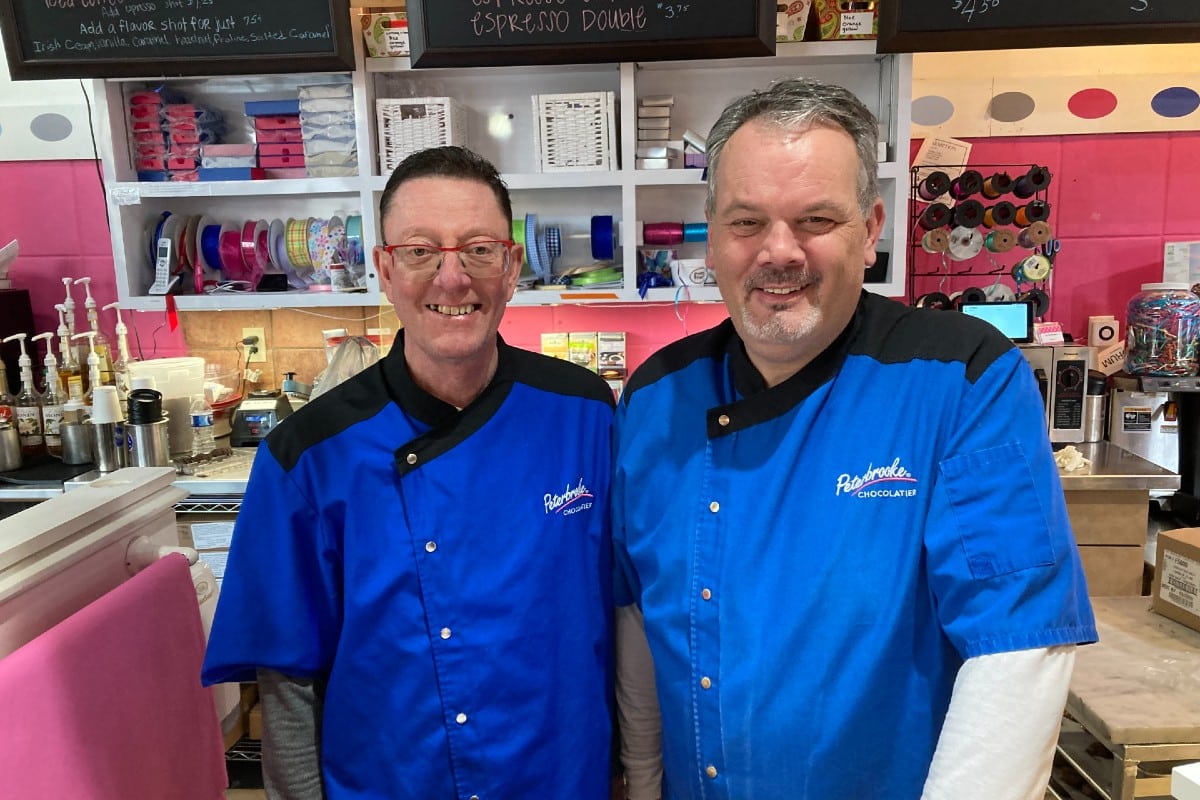
Peachtree Corners will soon lose one of its most iconic, popular and tasty businesses.
Peterbrooke Chocolatier, run by Geoffrey Wilson and Scott Gottuso, has been told by Peachtree Forum landlords, North American Properties and Nuveen Real Estate, that its lease will not be renewed. The last day of business will be July 25.
Meanwhile, Peachtree Forum is getting several new stores. They include Kendra Scott, Sucre, and The NOW Massage. Previously announced were Alloy Personal Training, Cookie Fix, Gallery Anderson Smith, Giulia, Lovesac, Nando’s Peri-Peri and Stretchlab. Wilson adds: “We are not in their big picture.”
Wilson has operated Peterbrooke at the Peachtree Forum for 14 years and Gottuso has been there nine years. They have made the chocolatier profitable and doubled sales. Wilson says: “We turned it around through community involvement and made relationships. We worked with the schools, gave donations, did a lot in the community, and made a difference. We produce most everything we sell in the shop, so it’s labor intensive. We make European-style chocolate treats from scratch from the very best ingredients, package it, make gift baskets, and also sell a lot of gelato.”
Key items include truffles, hand-made caramels, cherry cordials, chocolate-covered cookies and pretzels and strawberries hand-dipped in their own blend of chocolates. (They are all good!) One of Wilson’s and Gottuso’s most iconic products is chocolate popcorn. Once you try it, regular popcorn is tasteless. “We sell a lot of it.” Wilson adds: “Gelato sales have carried us in the summertime, since there are not many chocolate holidays in the summer.”
Peterbrooke now has five employees, and would like to have 10, but it is difficult to hire people with the skills in chocolatiering. A key part of its business is corporate companies, such as Delta Air Lines and Capital Insight. The Peachtree Corners’ Peterbrooke has corporate customers as far away as Cleveland, Ohio.
The operators were surprised when the Forum owners did not renew its five year lease. “The big decisions were made in Charlotte or Cincinnati, not locally,” Wilson feels. “We were no longer in their big picture. They want new and glitzy, shiny, fancy and trendy.”
The operators plan to start their own chocolate company, to be called “Scoffrey,” and initially sell online, plus have pop-up locations during holidays, and possibly have a booth in other merchants’ stores on occasions.
“Whatever we do would look different. We might rent a space somewhere close by so that people can still have the good chocolate experience with us, but we won’t have a regular audience walking by.”
Another element: the price of chocolate futures has spiked this year, with a bad crop production year. Wilson says: “That is key to our business and a huge cost increase. That doesn’t help.”
Wilson adds that the forced closing of the Peterbrooke location “is something like the death of a friend. But you go to the funeral and to the wake, and in six months or a year, It won’t be so bad.”
Have a comment? Send to: elliott@elliottbrack
Written by Elliott Brack
This material is presented with permission from Elliott Brack’s GwinnettForum, an online site published Tuesdays and Fridays. To become better informed about Gwinnett, subscribe (at no cost) at GwinnettForum
Related
Community
The Transformative Trail: Dr. Sunit Singhal’s Journey to Wellness
Published
4 weeks agoon
April 1, 2024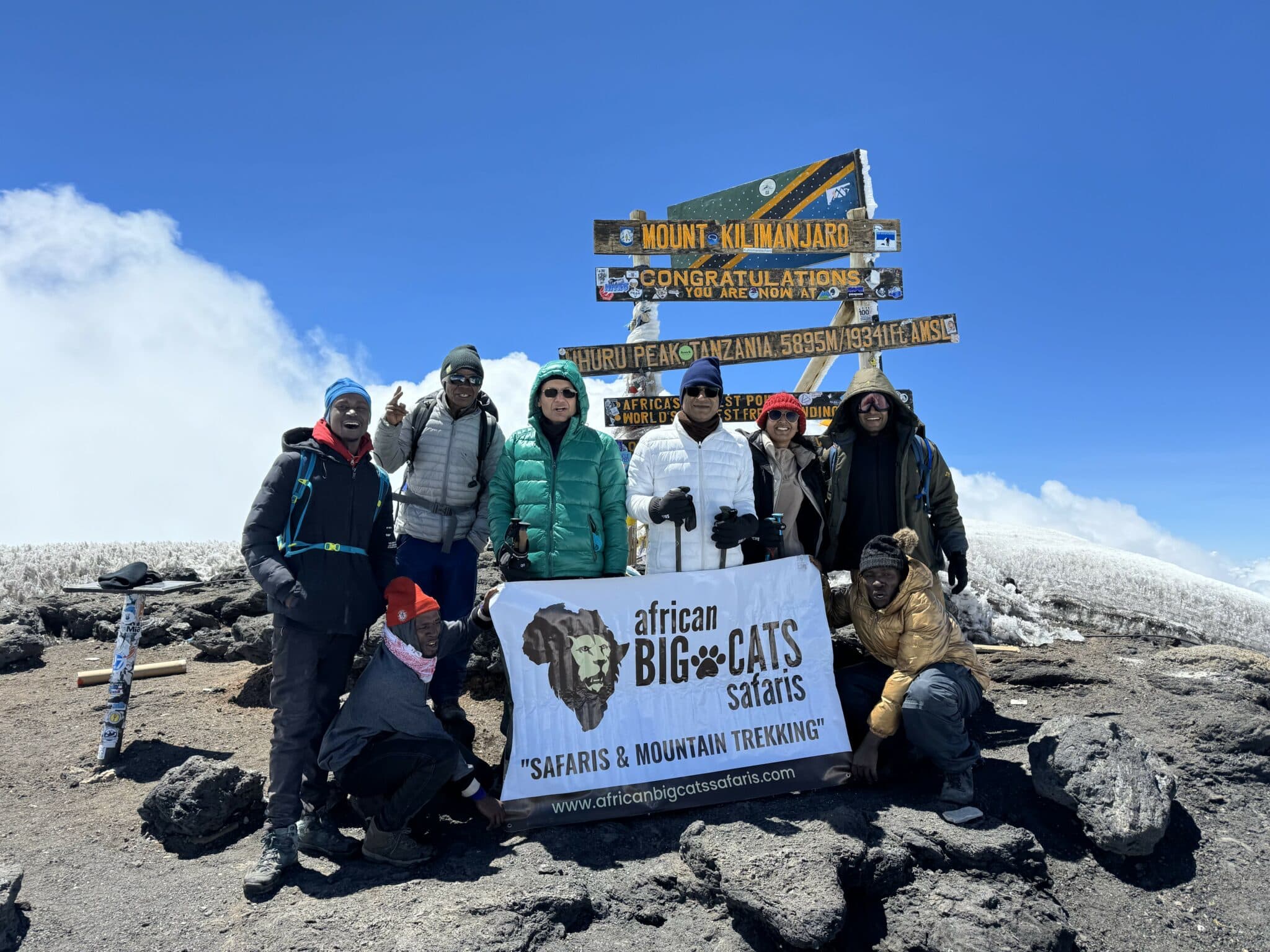
For more than two decades, Dr. Sunit Singhal has been a member of the Peachtree Corners community. In February 2001, he opened Suburban Medical Center, making a significant contribution to community healthcare. Under his leadership, the medical center has expanded, notably by introducing Suburban Med Spa next door.
A 1988 graduate of the University College of Medical Sciences in New Delhi, India, Dr. Singhal furthered his expertise in the United States, completing his residency in Internal Medicine at Harlem Hospital Center in New York.
An awakening at the Grand Canyon
A few years ago, the 60-year-old physician had an eye-opening moment about his own health. Most of his life was spent being overweight, which he accepted and managed the best he could.
“It’s not a secret that I was overweight. Anyone could see it; it’s how I was my whole life,” said Dr. Singhal.
The pivotal moment for Dr. Singhal was his attempt to join friends on a hike at the Grand Canyon a few years back. Despite his determination, Dr. Singhal was unprepared for the hike’s demands.
“I thought, okay, I will meet my friends one-third of the way down the canyon from the opposite end. That way, I can keep up with them towards the end of the hike,” he shared.
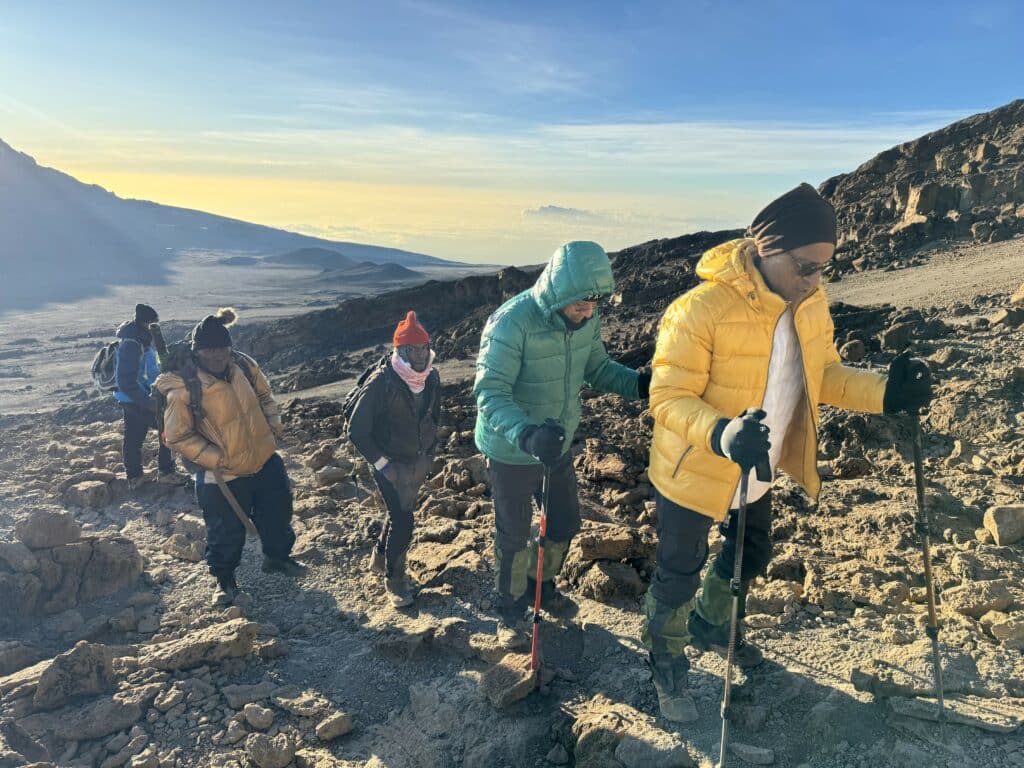
Even starting much later, Dr. Singhal struggled greatly with the hike. He experienced knee pain, breathlessness, and exhaustion. His struggle not only slowed him down but also his friends, who had been hiking for an additional 12 hours before he joined them.
The ordeal ended in the middle of a cold night, leading to a physically taxing recovery period that left Dr. Singhal sore for days.
Despite the arduous experience at the Grand Canyon, Dr. Singhal didn’t retire his hiking boots. Feeling motivated to conquer the obstacle, he began walking long miles with friends to get into shape.
A few months later, the call of the canyon echoed again, and friends proposed a new challenge: hiking from the South Rim to the river and back. While less daunting than their previous endeavor, the task was intimidating.
“This time, I was able to make the hike without holding anyone back,” he shared. Dr. Singhal already saw the difference his efforts were making.
His triumphs over physical and mental barriers were clear and exciting. Dr. Singhal’s return to the canyon increased his resilience and personal growth.
Conquering Kilimanjaro: a test of determination
Following a series of hikes through the Grand Canyon as his health improved, Dr. Singhal and his hiking group set their sights on Mount Kilimanjaro. They regularly engaged in 10-mile hikes each week to prepare for the trek.
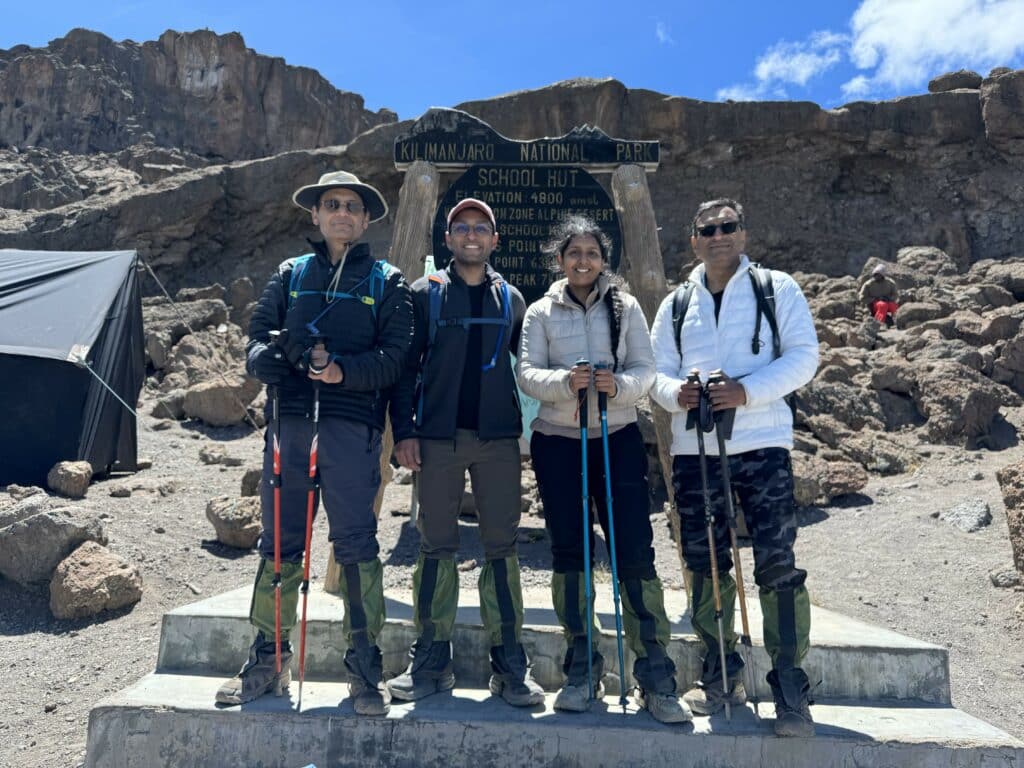
“It was never on our minds to simply skip or cut the hike short because we didn’t feel like it that day,” Dr. Singhal said. Even family members occasionally joined, keeping pace with the senior group with varying success.
When the time arrived for their Kilimanjaro quest, they needed to identify the number of days their group would need to complete it.
“There are different levels you can choose for hikes. If you are very athletic, the 5-day hike is for you. It goes all the way up to 9 days if you need to go slowly,” Dr. Singhal explained.
The friends chose the six-day option. It seemed like a good balance of their confidence in their fitness coupled with a conservative approach. Yet, they completed the ascent in five days.
“We couldn’t believe we finished at such a quick pace. We weren’t straining ourselves to do it. It was the natural pace we wanted to go, and we finished with the group we viewed as the most fit and athletic.”
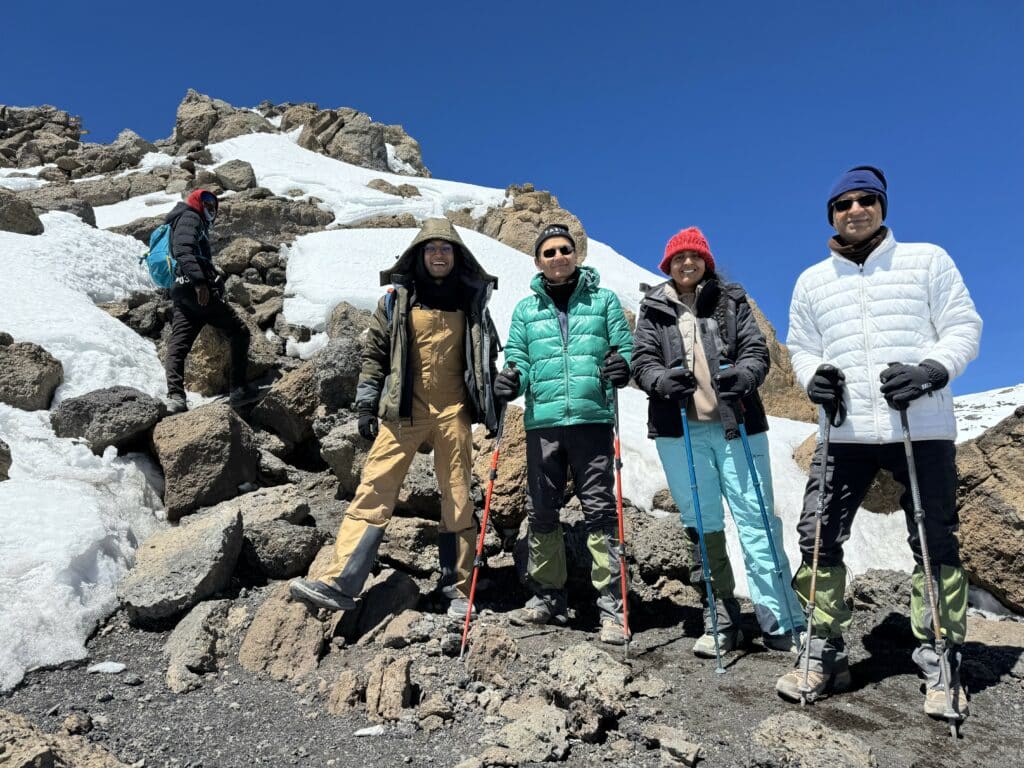
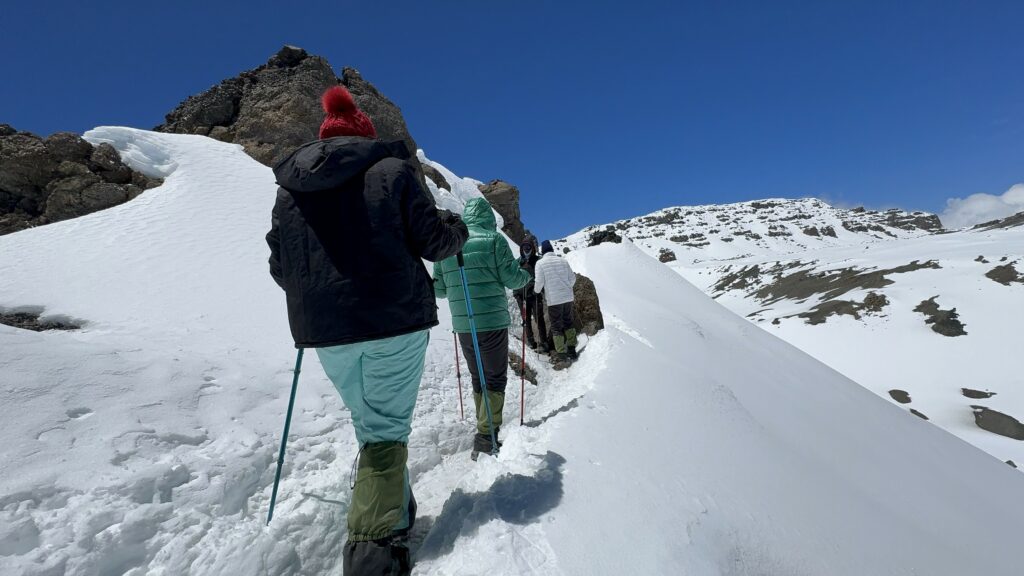
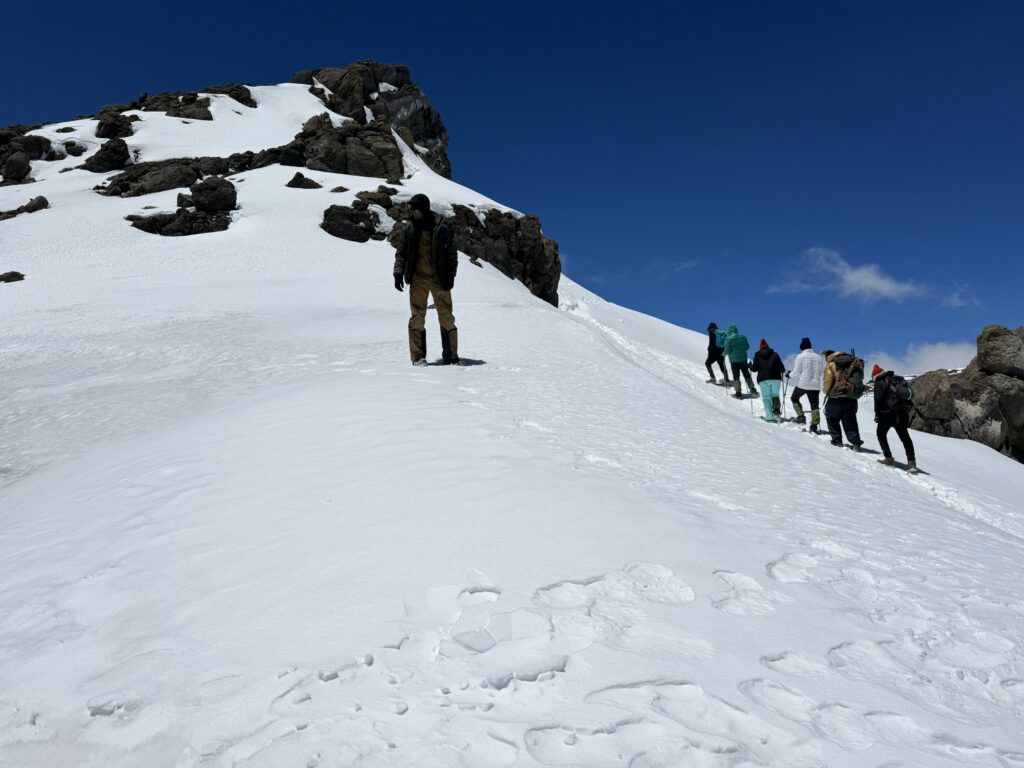
Mount Everest on the horizon
The hiking group isn’t resting on their laurels, though. The crew continues to meet and train for their next goal, climbing Mount Everest.
“There’s a lottery to be accepted to climb. We entered and are hoping to be selected for a hike this fall,” Dr. Singhal shared. When asked if he felt intimidated about this potential hike, he confidently replied, “No, not really.”
The team of friends will hear this summer if they are selected to climb.
Health and hope
Dr. Singhal’s health journey is the perfect example of the potential for change at any stage of life. It also highlights the importance of self-care, perseverance and pursuing one’s goals, regardless of the starting point.
His patients can rest easily. He isn’t walking away from his practice for the mountains full-time. Dr. Singhal is committed to his practice and patients. He firmly believes and displays that personal improvement and professional dedication can coexist harmoniously.
“I want my patients to know that I am equally dedicated to being here for them and their own health journeys.” When he’s not hitting the trails, Dr. Singhal can be found spending time with his family in Duluth or at his practice in Peachtree Corners.
Related
Community
Local Youngsters Learn Life Lessons Through Community Service
Published
4 weeks agoon
March 31, 2024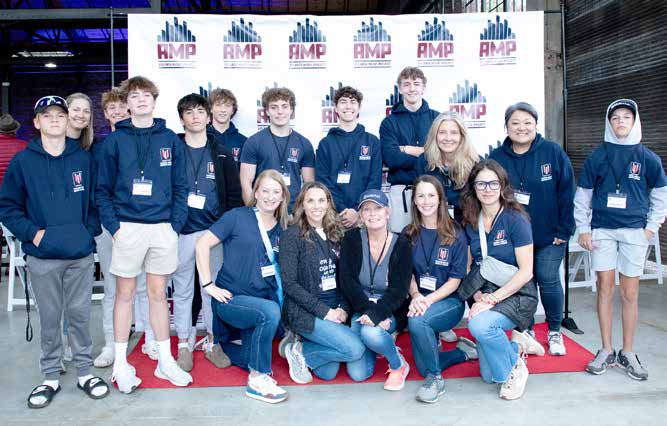
What started 20 years ago with two Texas moms looking for ways to get their sons involved in community service projects while spending quality time together turned into the Young Men’s Service League (YSML).
The national organization has dozens of chapters in 20 states, including Georgia.
Peachtree Corners mom, Heather Fleming, heard of a chapter in the northeast part of metro Atlanta, but it was pretty much at capacity.
“The way the chapters work is each class can only have around 30 boys,” she said.
“The more people you have in your chapter, the harder it might be for people to get hours in and just managing that number of people [can be difficult],” she added.
Taking matters into her own hands
Fleming partnered with another mom whose son couldn’t get into the chapter either to start their own.
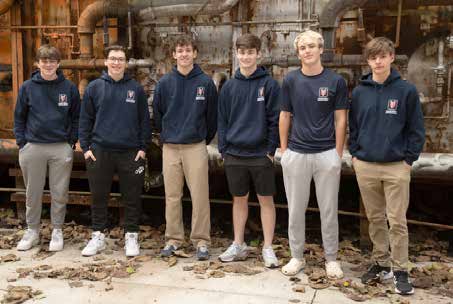
“She was determined that she wanted her boys to be able to have this experience,” said Fleming.
“Our chapter started with a full ninth-grade class , and then the tenth-grade class was a little bit smaller, with around 20 boys,” she added.
Even though it’s a good way for public school students to earn community service hours, most of the participants attend private schools that don’t have that requirement.
They do it to do good in the community and to have fun hanging out with their moms.
“The whole point is that we only have four years left before our sons go off to whatever their next step is after they graduate from high school,” said Fleming.
“It’s just to have that quality time together, serving the community and then also to give them the opportunity to hear from speakers they would not ever necessarily have access to,” she added.
Preparing the next generation
Fleming’s son Luke graduates next year and he’s found fulfillment in YMSL.
“It has been fun serving our community with many of my friends and their moms. I have also learned a lot from the various speakers we have had over the years,” said Luke. One of my favorite speakers was Tyler Hannel, who spoke about how to be a better version of yourself.”
There are many charities that need volunteers, and many align with the skills and interests of the young men.
“My most memorable experiences were serving with BlazeSports at their annual Big Peach Slam basketball tournament the last two years,” said Luke.
“Watching kids my age play basketball from a wheelchair was so inspiring. I am thankful for an organization like BlazeSports that gives kids and adults with disabilities a way to still compete in a variety of sporting events,” he stated.
Tracey Shell and her son, Carson, have similar views.
“Our first year was last year, so I didn’t know about this organization when my older son was in high school,” said Shell. “They learn about things like life skills and leadership, … but the real heart of the organization is volunteering in your community and learning about local philanthropy.”
Each YMSL chapter works with a certain number of nonprofits each year—usually nearby. Although this chapter is called the John’s Creek Young Men Service League, it has members from Peachtree Corners, Norcross, Berkeley Lake, Alpharetta and John’s Creek.
YMSL donates time and energy, not money
Every year, each chapter does what it calls the ultimate gift. This time around, the Johns Creek chapter went farther outside its boundaries and helped the Atlanta Music Project (AMP). It’s a nonprofit organization founded in 2010 to provide tuition-free world-class music training and performance opportunities in under-resourced communities.
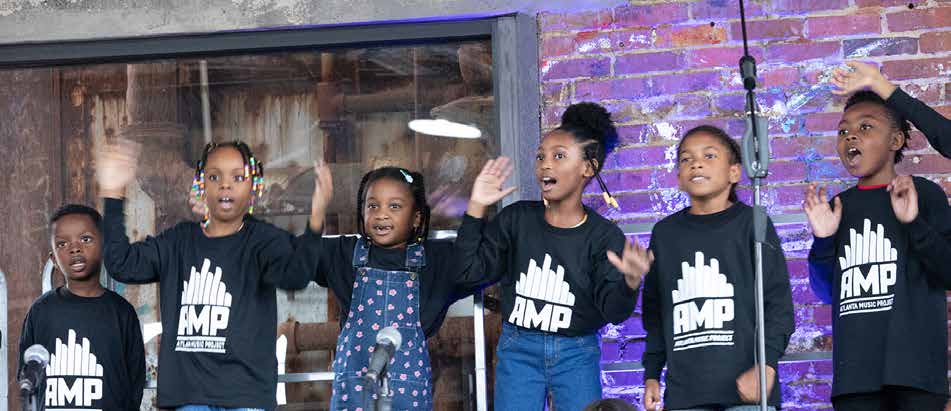
In October, AMP presented its first event, which brought together its entire community of performers for an afternoon of music and fellowship. The AMP Experience took place at Pullman Yards and featured performances from past and present students, with about 500 participants in total.
To pull off such a feat, AMP needed many volunteer ushers and stage crew. That’s where Johns Creek YMSL stepped in, with nearly 80 local YMSL volunteers who gave 246 service hours. Mom and son volunteers loaded instruments, set up and cleaned up, served as parking lot attendants and greeters and supported social media outreach.
Both Fleming and Shell have seen their boys grow and mature and are proud of the young men they are becoming.
“They become more aware of the different nonprofits and philanthropy that are just right in our own backyard that they might not have known about,” said Shell.
Fleming echoed that sentiment. Her older son Andrew is a sophomore at Clemson University, and she’s seen him carry the lessons learned at YMSL into his daily life by being actively involved with service projects in his fraternity and a mission trip over Spring Break.
“He definitely has a heart for helping others, which … is the ultimate goal. When they’re not living at home, and I’m not necessarily making them serve, they want to do this on their own in college and beyond,” she said.
For more information, visit ymsljohnscreek.org.
Related
Read the Digital Edition
Subscribe
Keep Up With Peachtree Corners News
Join our mailing list to receive the latest news and updates from our team.
You have Successfully Subscribed!

Exploring Israeli Innovation in the Smart City Sector with Einav Gabbay [Podcast]

BRACK: Peachtree Corners to lose Peterbrooke Chocolatier

Georgia United Methodist Foundation Announces Changes to Finance Team

North American Properties Revitalizes Avenue East Cobb

Spring Voting Will Determine Important Gwinnett School Board Elections

Kendra Scott Opens New Store At The Forum

Local Non-profit Boy With a Ball Announces Dates for Upcoming Conference

Kendra Scott Opens New Store At The Forum

Local Non-profit Boy With a Ball Announces Dates for Upcoming Conference

Spring Voting Will Determine Important Gwinnett School Board Elections

BRACK: Peachtree Corners to lose Peterbrooke Chocolatier

Georgia United Methodist Foundation Announces Changes to Finance Team

North American Properties Revitalizes Avenue East Cobb

Exploring Israeli Innovation in the Smart City Sector with Einav Gabbay [Podcast]

North American Properties Secures 3 New Brands for The Forum

Light up the Corners [Video]

Capitalist Sage: Business Leadership in Your Community [Podcast]

Cliff Bramble: A Culinary Adventure through Italy

Top 10 Brunch Places in Gwinnett County

A Hunger for Hospitality

THE CORNERS EPISODE 3 – BLAXICAN PART 1

Top 10 Indoor Things To Do This Winter

The ED Hour: What it takes to Remove Barriers from Education
Peachtree Corners Life
Topics and Categories
Trending
-
Business1 week ago
BRACK: Peachtree Corners to lose Peterbrooke Chocolatier
-
Education4 days ago
Spring Voting Will Determine Important Gwinnett School Board Elections
-
Business1 day ago
Kendra Scott Opens New Store At The Forum
-
Doing Good3 days ago
Local Non-profit Boy With a Ball Announces Dates for Upcoming Conference





